| 15 June |
• yesterday • tomorrow |
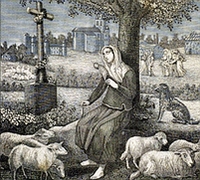
• Germaine of Pibrac
• Germana...
Daughter of Laurent Cousin, a farm worker, and Marie Laroche. Her mother died while Germaine was an infant. A sickly child, Germaine suffered from scrofula, and her right hand was deformed. Ignored by her father and abused by her step-family, she was often forced to sleep in the stable or in a cupboard under the stairs, was fed on scraps, beaten or scalded with hot water for misdeeds, real or imagined.
At age nine Germaine was put to work as a shepherdess, where she spent much time praying, sometimes using a rosary she made from a knotted string. She refused to miss Mass, and if she heard the bell announcing services, she set her crook and her distaff in the ground, declared her flock to be under the care of her guardian angel, and went to church; her sheep were unharmed during her absences. It is reported that once she crossed the raging Courbet River by walking over the waters so she could get to church.
Germaine was so poor it is hard to imagine she would be able to help others, but she was always ready to try, especially children whom she gathered in the fields to teach a simple catechism and share the little food she had. The locals laughed at her religious devotion, and called her 'the little bigot'.
Once in winter, her stepmother, Hortense, accused her of stealing bread by hiding it in her apron, and threatened to beat her with a stick. Germaine opened her apron, and summer flowers tumbled out. Her parents and neighbors were awed by the obvious miracle, and began to treat her as a holy person. Her parents invited her to rejoin the household, but Germaine chose to live as she had.
In 1601 she was found dead on her straw pallet under the stairs, and she was buried in the Church of Pibrac opposite the pulpit. When accidentally exhumed in 1644 during a renovation, her body was found incorrupt. In 1793 the casket was desecrated by an anti-Catholic tinsmith named Toulza, who with three accomplices took out the remains and buried them in the sacristy, throwing quick-lime and water on them. After the French Revolution, her body was found to be still intact save where the quick-lime had done its work.
Documents attest to more than 400 miracles or extraordinary graces received through the intervention of Saint Germain. They include cures of every kind (of blindness, both congenital and resulting from disease, of hip and of spinal disease), and the multiplication of food for the distressed community of the Good Shepherd at Bourges, France in 1845.
1579 at Pibrac, France
• 1601 in her parents' home in Pibrac, France, apparently of natural causes
• relics interred in the church at Pibrac
29 June 1867 by Pope Blessed Pius IX
• abandoned or neglected people
• abuse victims, child abuse victims
• against bodily ills, illness, sickness; sick people
• against impoverishment, poverty; poor people
• disabled, handicapped or physically challenged people
• girls from rural areas; peasant girls; country girls
• against the loss of parents
• shepherdesses
• unattractive people
• girl with a distaff (it's used in spinning thread)
• girl with a sheep
• girl with a shepherd's crook
• girl with a watchdog
• girl with flowers in her apron
• peasant girl dying alone in poverty
• peasant girl tending sheep
• peasant girl with flowers falling around her in winter
• books, medals, pendants, rosary
Dear God, please don't let me be too hungry or too thirsty. Help me to please my mother. And help me to please you. - prayer of Saint Germaine
https://catholicsaints.info/saint-germaine-cousin/
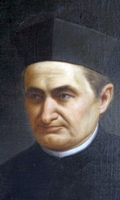
Palazzolino (childhood nickname)
22 May (Diocese of Bergamo, Italy; Poverelle Sisters, based on the date of founding of the Sisters)
Youngest of eight boys born to Octavius and Theresa Antoine Palazzolo; his father died when Luigi was about 10 years old. Ordained a priest in the diocese of Bergamo, Italy on 23 June 1850. As a parish priest, he would occasionally encounter children who were abandoned or orphaned and living on their own; he would take them in and care for them until he could get them placed somewhere caring and safe. He founded the Little House of Divine Providence to care for neglected children, and the Work of Saint Dorothy home to care for abandoned girls. Founded the Brothers of the Sacred Family, a congregation that died out in 1928. With Venerable Maria Teresa Gabrieli, he founded the Sisters of the Poor (Poverelle Sisters; Palazzolo Institute) on 22 May 1869 to care for and educate neglected girls; the Sisters received papal approval from Pope Pius X on 25 May 1912, and continue their good work today in Brazil, Burkina Faso, Congo, Italy, Ivory Coast, Kenya, Malawi, Peru and Switzerland. Founded an orphanage in Traona, Italy on 4 October 1872. Due to respiratory problems, Father Luigi had to sleep sitting up during the last year or so of his life.
10 December 1827 in Bergamo, Kingdom of Lombardy-Venetia (in modern Italy)
• in the early hours of 15 June 1886 in Bergamo, Italy of natural causes
• he died murmuring the name "Jesus Christ" over and over
• buried in the cemetery of San Giorgio in Bergamo
• re-interred at the mother-house of the Poverelle Sisters, Via San Bernardino 56, Bergamo, on 4 January 1904
• 19 March 1963 by Pope John XXIII
• beatification recognition celebrated in the Basilica of Saint Peter in Rome, Italy
• one of the beatification miracles involved the healing of a young Sardinian woman with peritonitis and tuberculosis on the afternoon of 21 July 1956 when she had a vision of Father Luigi asking her to get out of bed and go to church to thank God for her cure
• another beatification miracle involved the 1959 healing of a 65 year old woman from a severe head injury that left her comatose; the cure followed the family praying for the intercession of Father Luigi
• 15 May 2022 by Pope Francis
• the canonization miracle involved the healing of Sister Gianmarisa Perani, who had joined the Poverelle Sisters in 1950; in November 2015 was rushed into emergency surgery, experienced complications, lapsed into a coma, and two months later was declared to be terminal; the Sisters prayed for her, she soon after recovered, and is alive and well today
Sisters of the Poor
https://catholicsaints.info/saint-luigi-maria-palazzolo/
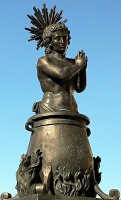
Guy, Veit, Vith, Vito
Legend says that Vitus was the son of a pagan Sicilian senator named Hylas. The boy was converted to Christianity at age twelve by his tutor, Saint Modestus, and his nurse Saint Crescentia. His father showed his objection to the conversion by having all three arrested and scourged.
Freed from prison by angels, they fled to Lucania, then Rome. There Vitus freed the son of Emperor Diocletian from an evil spirit. When Vitus would not sacrifice to the pagan gods in celebration, his cure was attributed to sorcery, and he and his household were arrested again. Tortured, and condemned to death, they were thrown to the lions; the lions would not touch them, so they were thrown into boiling oil. At the moment of their deaths, a immense storm destroyed several pagan temples in the region, which led to the tradition of protection against stormy weather. One of the Fourteen Holy Helpers.
For obscure reasons, some 16th century Germans believed they could obtain a year's good health by dancing before a statue of Saint Vitus on his feast day. This dancing developed almost into a mania, and was confused with chorea, the nervous condition later known as Saint Vitus' Dance, the saint being invoked against it. His connection with such "dancing" led to his patronage of dancers, and later to entertainers in general and in particular.
When Vitus was thrown into the oil, a rooster was thrown into the oil with him, sacrificed as part of the ritual against sorcery. A rooster became a symbol for Vitus, and its connection with early rising led to Vitus's patronage and protection against oversleeping.
boiled in oil c.303 in Lucania, Italy
• against animal attacks
• against dog bites
• against epilepsy; epileptics
• against lightning
• against over-sleeping
• against rheumatic chorea or Saint Vitus Dance
• against snake bites
• against storms
• against wild beasts
• actors
• comedians; comediennes
• dancers
• dogs
• Bohemia
• Czech Republic
• Serbia
• 17 cities
• dog
• rooster
https://catholicsaints.info/saint-vitus/

• Apostle of the Alps
• Bernard of Aosta
• Bernard of Aotha
• Bernard of Mentone
• Bernard of Montjoux
Born to the French nobility. Priest. Archdeacon of Aosta in 996. Evangelized the people of the Alps for over 40 years. Vicar-general of Alpine diocese. He started a patrol that cleared robbers from the mountains, and he established hospices for travellers and pilgrims to Rome, Italy; he established a community of Augustinian Hospitallers to staff them, and they continue their good work today. The large dogs, trained to search for lost victims in the mountains, are named for him.
c.923 at Menthon, Savoy (in modern France)
1008 at Novara, Italy
1681 by Pope Innocent XI
• Alpinists
• Alps (proclaimed by Pope Pius XI on 20 August 1923)
• Campiglia Cervo, Italy
• mountain climbers (proclaimed by Pope Pius XI on 20 August 1923)
• mountaineers
• skiers
• travellers in the mountains (proclaimed by Pope Pius XI on 20 August 1923)
• man in a mountain setting holding a bishop's crozier
• white dog
https://catholicsaints.info/saint-bernard-of-menthon/

• Albertina Serva de Deus
• Albertina, Servant of God
Lay person in the diocese of Tubarão, Brazil. Raised in a pious family who insured that Albertina had a strong foundation in the faith. Baptized on 25 May 1919, Confirmed on 9 March 1925, and made her First Communion on 16 August 1928. At age 12 she was attacked by one of her father's employees, who tried to rape her. She fought back; when he realized he would fail and she would identify him, the attacker killed Albertina; she is considered a martyr in the defense of chastity.
11 April 1919 in São Luís, Imaruí, Santa Catarina, Brazil
stabbed in the heart with a pen knife during a rape attempt on 15 June 1931 in São Luís, Imaruí, Santa Catarina, Brazil
• 20 October 2007 by Pope Benedict XVI
• recognition celebrated by Cardinal José Saraiva Martins in the cathedral of Tubarão, Brazil
https://catholicsaints.info/blessed-albertina-berkenbrock/
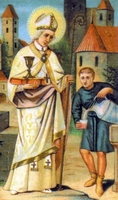
Isfried, Isfrido
17 February in the Diocese of Osnabrück, Germany and the Archdiocese of Hamburg, Germany
Premonstratensian canon at the Cappenenberg monastery in Westphalia (in modern Germany). Provost of the Premonstratensian house of Jerichow in 1159. Bishop of Ratzeburg, Germany in 1180; he served for 24 years, continued to live by the Premonstratensian rule, and was known for his simple life. He worked to bring the Wends to Christianity. Restored the monastery of Floreffe (in modern Belgium) after it burned, and built many churches throughout the region. Recorded miracles include changing water to wine when needed, and healing a blind man by reciting Scripture over him.
c.1115 in Germany
• 15 June 1204 at Ratzeburg, Holstein, Germany of natural causes
• buried in the choir of the cathedral in Ratzeburg
20 March 1728 and 12 April 1728 by Pope Benedict XIII (cultus confirmation)
https://catholicsaints.info/blessed-isfrid-of-ratzeburg/

• Hilarian of Lévinhac
• Hilarian of Perse
• Ylariano, Hylariano
Born to the Gallic nobility, he was known as a pious child. Priest in Lévinhac, France. He would often pass through an area of Muslim occupation, cross the River Lot, and celebrate Mass in the town of Perse. Martyr.
c.700 in L•vinhac, France
• beheaded c.793 in Perse, diocese of Rodez, France
• legend says that the body got up, washed the blood off the severated head, and then took it to his mother; he had jokingly promised he would do so every time she nagged him of the danger of passing through Muslim territory to being the Sacraments to the people of Perse
• buried in Lévinhac, France
• relics enshrined in Perse where they are a stop on the route for pilgrims to Santiago de Compostela
10 May 1883 by Pope Leo XIII (cultus confirmation)
https://catholicsaints.info/saint-hilarion-of-espalion/

Landelinus, Lando, Landolin, Landolinus
Born to the nobility, Landelinus lived for a time as a highway bandit, but repented and became a Benedictine monk. Priest. Founded monasteries in France and Belgium including Lobbes, Beligum in 654; Aulne Abbey, Belgium in 656; Wallers, France in 657; Crespin, France in 670. Worked with Saint Ursmar. Spiritual director of Saint Hadelin of Lobbes and Saint Domitian of Lobbes.
c.625 near Bapaume, France
686 of natural causes
https://catholicsaints.info/saint-landelin-of-crespin/
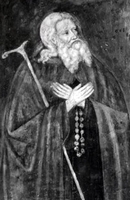
Pietro became a Gerolamini (Hermits of Saint Jerome) monk as a young man, lived most of his adult life in the Gerolamini house of Montebello, Italy, and later retired from communal life to live as a hermit near Urbino, Italy. He was known as a very pious man, and devotion developed soon after his death.
Urbino, Italy
• 15 June 1415 at the hospice for the sick at the Gerolamini house of San Giovanni Battista near Urbino, Italy of natural causes
• buried under the side altar in the church of San Giovanni Battista the Forerunner
• relics enshrined in a crystal urn under the main altar of the church
https://catholicsaints.info/blessed-pietro-spagnoli/
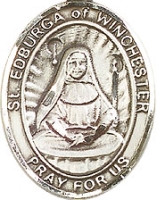
Eadburh, Edburga
Daughter of King Edward the Elder and Edgiva of Kent; grand-daughter of King Alfred the Great. As a child she was placed in the convent of Nunnaminster, Winchester, England, which King Alfred's widow had founded. She lived her whole life there, a holy nun and abbess.
• 15 June 960 of natural causes
• interred at the Nunnaminster convent, Winchester, England
• some relics translated to Pershore Abbey, Worcestershire, England, which became famous for its miracles
972 by Pope John XIII
https://catholicsaints.info/saint-edburgh-of-winchester/
Aegil, Aegilius, Aeigil, Aeigilus, Aigil, Egil, Eygil, Fiegil, Figil
Born to the Bavarian nobility; nephew of Saint Sturmi of Fulda. Educated in Fulda, Germany in the monastery of his uncle Sturmi. Eigil became a Benedictine monk in Fulda. Priest. Teacher at the monastery school. Abbot of the monastery in 817, a house that was in decline at that point. He restored the community, built churches, founded another house, and trained his successor, Saint Rabanus Maurus.
c.750 in Bavaria, Germany
15 June 822 in Fulda, Germany of natural causes
https://catholicsaints.info/saint-eigil/
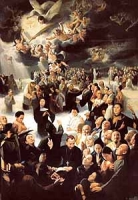
• Barbara Cui Lianzhi
• Parui
Married lay woman in the apostolic vicariate of Southeastern Zhili (in modern China). Mother. Imprisoned, tortured and murdered for her faith. Martyr.
c.1849 in Xiaotian, Hejian County, Hebei, China
15 June 1900 in Liushuitao, Hejian County, Hebei, China
1 October 2000 by Pope John Paul II
https://catholicsaints.info/saint-barbara-cui-lianshi/
Akaikos, Akaikus
First-century Christian mentioned by the Saint Paul the Apostle in 1st Corinthians as taking correspondence back and forth between Paul and the Corinthians. Orthodox tradition makes him one of the 70 Disciples.
I rejoice in the arrival of Stephanas, Fortunatus, and Achaicus, because they made up for your absence, for they refreshed my spirit as well as yours. So give recognition to such people. - 1st Corinthians 16:17-18
https://catholicsaints.info/saint-achaicus-of-corinth/
While seeking to learn from hermits, Abraham was captured by bandits in Egypt, he was imprisoned and enslaved by them for five years before he could escape. Making his way to Europe, he lived as a hermit near Clermont, Gaul (modern France). Priest. Abbot of Saint Cyriacus abbey.
on the banks of the River Euphrates in Mesopotamia (in modern Iraq)
c.480 in Arvernia, Aquitaine (in modern France) of natural causes
against fever
https://catholicsaints.info/saint-abraham-of-cyriacus/
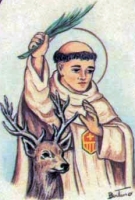
Mercedarian. Commander of the convent of Santa Maria in Narbonne, France. Travelled to Moorish occupied Granada to ransom Christians imprisoned and enslaved by Moors, and to preach Christianity. He was immediately arrested, stripped of the money brought to ransom prisoners, beaten, imprisoned, tortured, and left to die. Martyr.
Perpignan, France
1422 in Granada, Spain
https://catholicsaints.info/saint-pierre-de-cervis/
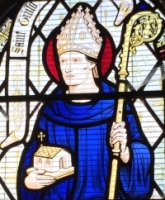
Drillo, Drel
Son of an Amorican chief in Brittany, France. Missionary to Wales. Monk at Bardsey. The towns of Llandrillo in Denbighshire, and Llandrillo yn Rhos (Rhos-on-Sea) are named for him.
6th-century Brittany
6th-century
• Llandrillo, Denbighshire, Wales
• Llandrillo yn Rhos, Wales
https://catholicsaints.info/saint-trillo-of-wales/
First-century Christian mentioned by the Saint Paul the Apostle in 1st Corinthians as taking correspondence back and forth between Paul and the Corinthians. Orthodox tradition makes him one of the 70 Disciples.
I rejoice in the arrival of Stephanas, Fortunatus, and Achaicus, because they made up for your absence, for they refreshed my spirit as well as yours. So give recognition to such people. - 1st Corinthians 16:17-18
https://catholicsaints.info/saint-fortunatus-of-corinth/
• 29 October as one of the Martyrs of Douai
• 22 November as one of the Martyrs of England, Scotland, and Wales
Priest in the apostolic vicariate of England during a period of persecutions of Catholics. Martyr.
in Ripon, North Yorkshire, England
15 June 1598 in York, North Yorkshire, England
22 November 1987 by Pope John Paul II
https://catholicsaints.info/blessed-peter-snow/
22 November as one of the Martyrs of England, Scotland, and Wales
Married layman in the apostolic vicariate of England during a period of persecutions of Catholics. Martyr.
in Nidd, North Yorkshire, England
15 June 1598 in York, North Yorkshire, England
22 November 1987 by Pope John Paul II
https://catholicsaints.info/blessed-ralph-grimston/
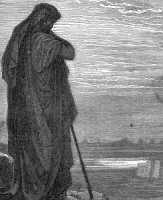
Eighth-century BC shepherd at Koa near Bethlehem. Of himself he said, "I am not a prophet, nor the son of a prophet; but I am a herdsman plucking wild figs." One of the Old Testament Minor Prophets, the book of Amos is one long denunciation of evildoers.
scourged, and then an iron spike driven through his temples
https://catholicsaints.info/amos-the-prophet/
Beoc, Vauge, Vorech
Priest in the diocese of Armagh, Ireland. When he heard rumours that he was going to be chosen bishop of Armagh, Vaughe retired to live as a hermit in Penmarch, Cornwall, England. From his hermitage he would venture out to preach and evangelize the area residents.
15 June 585 of natural causes
https://catholicsaints.info/saint-vaughe-of-ireland/
4 May as one of the Carthusian Martyrs
Carthusian choir monk of the Charterhouse in London, England. Martyred for refusing to accept King Henry VIII as head of the Church.
starved to death on 15 June 1537 in Newgate Prison, London, England
29 December 1886 by Pope Leo XIII
https://catholicsaints.info/blessed-thomas-scryven/
• Hesychius of Dorostoro
• Esichio, Hesykhios, Isychius
Imperial Roman soldier in Durostorum, Moesia (modern Silistra, Bulgaria). Martyred with Saint Julius of Durostorum.
late 3rd-century
c.304 at Dorostorum, Moesia (modern Silistra, Bulgaria)
https://catholicsaints.info/saint-hesychius-of-durostorum/
Dulas (nickname)
Scourged, burned, tortured and martyred in the persecutions of Diocletian.
• disemboweled c.300 in Zephyrinu, Cilicia, Asia Minor
• his body was thrown into a ditch, and a sheepdog stood guard over it until local Christians could give him proper burial
https://catholicsaints.info/saint-tatian-of-cilicia/
Benilde, Benildes
Having seen the martyrdom of Saint Anastasius, Benildis was moved to make a public statement of her faith. Martyred by the Moors.
• burned at the stake in 853 in Cordoba, Spain
• ashes thrown into the River Guadalquivir
https://catholicsaints.info/saint-benildis-of-cordoba/

Founded a monastery in the forest of Argentan, France; it was later named Saint-Loyer-des-Champs in his honour. Bishop of Séez, France for thirty-two years.
c.756 of natural causes
https://catholicsaints.info/saint-lotharius-of-seez/
Orsiesius
Desert hermit. Writer. Spiritual student of Saint Pachomius in the desert in Egypt. Helped Pachomius develop the rules for the early desert monks. Head of the community of Tabenna. Saint Jerome translated some of his writings.
380 of natural causes
https://catholicsaints.info/saint-orsisius/
Hadelinus of Lobbes
Benedictine monk. Spiritual student of Saint Landelin of Crespin at Lobbes, Belgium. Friend of Saint Domitian of Lobbes.
c.686 of natural causes
https://catholicsaints.info/saint-hadelin-of-lobbes/
• Julius of Dorostoro
• Giulio
Martyr
.late 3rd-century
c.304 at Dorostorum, Moesia (modern Silistra, Bulgaria)
https://catholicsaints.info/saint-julius-of-durostorum/
Feock, Fiech, Veho, Vougar, Vougas
Sixth century bishop in Ireland. Retiring from public work, he settled in Brittany to live as a hermit near Lesneven, France.
https://catholicsaints.info/saint-vouga-of-lesneven/
A monk at Jumièges Abbey in France. Friend of Saint Philibert of Jumièges. Bishop of Beauvais, France.
c.706 of natural causes
https://catholicsaints.info/saint-constantine-of-beauvais/
Benedictine monk. Spiritual student of Saint Landelin of Crespin at Lobbes, Belgium. Friend of Saint Hadelin of Lobbes.
c.686 of natural causes
https://catholicsaints.info/saint-domitian-of-lobbes/
Twelve-year-old girl martyred in the persecutions of Diocletian.
used as a target for archery practice in 303 in Palmyra, Syria
https://catholicsaints.info/saint-eutropia-of-palmyra/
Sister of Saint Libya of Palmyra. Martyred in the persecutions of Diocletian.
burned at the stake in 303 in Palmyra, Syria
https://catholicsaints.info/saint-leonides-of-palmyra/
Sister of Saint Leonides of Palmyra. Martyred in the persecutions of Diocletian.
beheaded in 303 in Palmyra, Syria
https://catholicsaints.info/saint-libya-of-palmyra/
Bishop of Viviers, France from 519 until his death; he served for 30 years.
c.549 of natural causes
https://catholicsaints.info/saint-melan-of-viviers/
Mercedarian friar. Ransomed at least 180 Christians enslaved by Muslims in north Africa.
https://catholicsaints.info/blessed-pedro-da-teruel/
Mercedarian friar. Ransomed at least 180 Christians enslaved by Muslims in north Africa.
https://catholicsaints.info/blessed-juan-rodriguez/
Eleven Christians martyred together. We known nothing else about them but the names - Anteon, Candidus, Cantianilla, Cantianus, Chrysogonus, Jocundus, Nivitus, Protus, Quintianus, Silvius, Theodolus
Lucania (modern Basilicata), Italy, date unknown
https://catholicsaints.info/martyrs-of-lucania-15-june/
• Nuestra Señora de Montemayor
• Ceneu ap Coel
• Clemente Vismara
• Elisabeth of Overloo
• Ferdinand of Portugal
• Pietro Nolasco Perra
CatholicSaints.Info Portable Edition